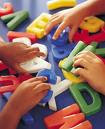Every parent wants to do what's right for his or her child.
It's a no-brainer. I don't think there's a mom or dad alive who would say otherwise, even those that are neglectful or abusive. Most of us really try to do right by our children. We think if we buy the right brands, read the right books, and stay informed about the myriad of dangers in the world, our kids will grow to be healthier and smarter than all the others.
So when a mom reads an article on a website like Huffington Post or listens to Jenny McCarthy, that protective instinct gets triggered. My god, they think. What if it's true? What if I'm subjecting my child to autism or a neurological disorder just to avoid a few days of sniffles? What kind of mother does that make me?
If the perceived dangers about vaccines were true, it would be our duty as parents to ask questions, to refuse unnecessary vaccinations and to boost our children's immune systems through more "natural" processes. If it were true that vaccines are dangerous.
The problem is, it's not true. The evidence piling up simply doesn't support that the risks of vaccines outweigh the benefits. (No, I won't add citations to prove my claim -- this isn't a science website. If you want citations, visit Science Based Medicine or Respectful Insolence. I often do.)
There's risk in everything. Every time I strap my baby into his car seat I feel an awesome sense of responsibility. It's a big scary world out there and anything can happen. Should I get him out of the car and take him back into the house? No. Because while the world may be scary, he has to learn to live in it. It's my job as a parent to teach him how, and giving into my fears sets the wrong example. The minor risk of a traffic collision is far less than the benefit of taking him to the grocery store so he can see new places and things, and see his mommy reacting calmly to all the lights, noise, and people.
Similarly, the benefits of vaccines outweigh the risks. Things can and do go wrong with vaccines, sometimes leading to health problems more severe than the ones the vaccines were designed to prevent. Rarely. And sometimes people get hit by meteorites hurtling from the sky. Again, rarely. Sometimes bad luck is unavoidable, but things seem to work out okay most of the time. A far more serious risk, in my mind and according to medical opinion, is of a serious, debilitating disease like mumps or polio. I can imagine all too well standing vigil by my son's hospital bed while he struggles for breath, suffering. The very image makes it hard for me to breathe. I want to turn away from the thought, but I won't. Because that horrifying scenario, which can happen, does happen to innocent children every day, is a real fear, one worth acting on. The imaginary fear of vaccine-induced autism, unsupported by any credible evidence, is not.
What it comes down to is trust. Who are the people making these outrageous claims about dangerous vaccines, causing fear and panic, hijacking our mothering instincts to further their political agendas? Are they doctors and scientists? Rarely. More often they are movie stars and talk show hosts. But for some reason, people trust familiar faces and are willing to accept any garbage that comes out of them.
Vaccine rejectionism is based on belief, not fact. There is no evidence strong enough to convince an anti-vaxer that he or she is wrong. It's my duty to teach my son how to distinguish between belief and fact. It's one of the greatest gifts a parent can pass on, right up there with a long life free of preventable disease. Because, like all parents, I want to do what's right for my child.
Subscribe to:
Post Comments (Atom)

1 comment:
I just found your blog through Respectful Insolence and I really appreciate your perspective on the pull of woo on concerned parents (or would-be parents). It's something we all recognize as a key to the success of the anti-vaccine movement, and one of the biggest challenges in countering it. In the end, I think a lot of the damage control falls to us, the parents who are also grounded in critical thinking. So thank you, han, for adding your voice to the cause :)
Post a Comment